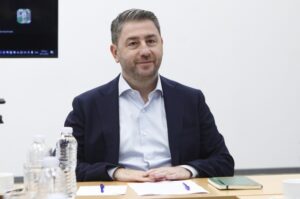The anti-fraud systems in place at HICC, coupled with audits carried out by EHRC have led to significant progress this year in identifying over-prescribing. The new filters have… the Ministry of Health and the relevant departments are designed to ensure that no doctor breaks the law, no patient is a “victim” of fraud and pharmaceutical costs do not escape due to irregularities.
The use of anti-fraud information systems developed by EDIKA “caught” 100 suspected cases of over-prescribing at the expense of EOPYY. Indicatively, in the first eight months of the year, these doctors prescribed from 250 to 422 different pharmaceutical preparations per patient, with total quantities ranging from 250 to 1,630 units.
Specific examples were presented yesterday by the Minister of Health,Adonis Georgiadis, during a press conference he held on this issue. Some, in fact, went viral with the most typical being that of a pathologist from Mytilene who was prescribing statins to her 15-year-old daughter and received a phone call from the Health Minister, replying that “she has a very rare condition” and “it won’t happen again.”
Today, doctors are sent a message via electronic prescribing when they exceed the average prescribing limit set for conditions, pieces of medication, etc. The state cannot “cut off” the doctor from prescribing drugs. It can, however, when it sees odd behaviour, call him for an explanation. The integration of diagnostic and treatment protocols is intended to prevent doctors from prescribing drugs when patients are undiagnosed with the condition the drugs are aimed at.
Electronic Health Record and Artificial Intelligence
What is certainly estimated to bring a big change in curbing odd prescribing behaviors is the activation of the Electronic Health Record. Once the diagnostic tests to which each patient undergoes are incorporated into each patient’s electronic health record, the system can “read” and cross-check all the data that confirms the diagnosis. The Electronic File will be ready in a year, according to what the Health Minister said yesterday, and is being funded with resources from the Recovery Fund.
At the same time, EOPYY’s audits are progressing and artificial intelligence is being introduced, as noted by EOPYY’s director, Theano Karpodini. This is expected to make the systems more advanced and faster to model corruption cases.
At the same time, Georgiades, in the wake of the fraud ring of fake prescriptions that was uncovered last month, had announced the installation of a new system of citizen consent in electronic prescribing, with a code (One Time Password, OTP), as is done in banking transactions. This measure was not mentioned at yesterday’s press conference, but it is assumed that it will be implemented. It is worth noting that there are many citizens in the AMKA of which may be prescribed drugs and tests however not know it as they do not have intangible prescription, a system that informs by sms for each transaction.
Controls and at the same time fight against polypharmacy
The services of the EOPYY and EDICA are to be expanded, serving another purpose at the same time as control of prescription: Combating any polypharmacy.
Policy to overwhelm the overwhelming need for the use of polygraphic drugs, which will also be used to prevent over-prescription of pharmaceuticals.
More specifically, control is expected on medications taken by people aged 60 and over, so that when they take more than five different formulations, the treating doctor is notified by text message to check for interactions and possible contraindications. In addition, whether an elderly person should receive so many preparations, as in many cases these citizens follow an automated procedure. They have known their prescriptions for years and go to the pharmacy requesting and purchasing their medications.
In a similar vein, the Minister of Health has called for the integration of all drug instruction sheets into e-prescribing so that drugs that interact with each other are not prescribed to the same person. It is a measure to protect public health and at the same time it is an economic measure, since by “filtering” those formulations that are administered, expenditure will be reduced.
Among what is expected in the coming period are more detailed checks on pharmacies and pharmacies. The Electronic Drug Tracking System (EMS) which monitors medicines in shortage at all “links” in the drug chain will be expanded to include many more formulations than the 500 medicines currently being monitored.
“We know what goes in from the pharmacies, what the pharmacies sell by pharmacy VAT number, we know what goes out since we have the electronic prescription system. So we receive that information and then it is the responsibility of the relevant agency or body to do the audit to verify if the data is true. So there is both the information and the control mechanism,” noted the Secretary General of Strategic Planning of the Ministry of Health, Aris Angelis.





